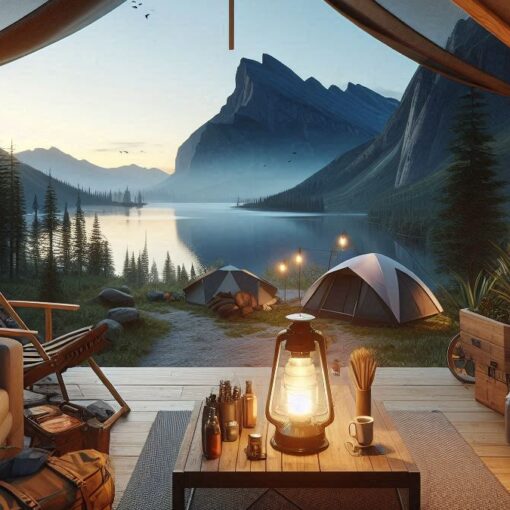Top Takeaways and Key Concepts
- Choose flat, hazard-free ground to avoid discomfort and prevent water pooling under your tent.
- Lay out and organize all gear first to ensure nothing is missing before assembly begins.
- Assemble the tent patiently by inserting poles correctly and asking for help if needed.
- Stake and secure the tent firmly to prevent wind damage and maintain structure overnight.
- Keep the tent clean and stable by managing gear placement and using simple maintenance habits.
Summary of This Article
This article explains how to confidently set up a tent by choosing a flat and safe campsite, organizing equipment before assembly, and carefully inserting and raising tent poles. It emphasizes teamwork, patience, and proper staking to secure the tent against wind. The article also shares tips on maintaining a clean campsite and enjoying the experience with friends. It encourages campers to embrace mistakes, laugh through challenges, and enjoy the adventure of camping outdoors.
Short Video Version of this Article
Anyone who loves being outside has to set up a tent. It can be like trying to solve a Rubik’s Cube with your eyes closed. You know what I mean, right? You pull onto your campsite, ready to roast marshmallows and look at the stars. But suddenly your tent rises up, and it looks more like a gigantic origami puzzle than a nice place to live.
Please Note: This post may contain affiliate links. If you click one of them, we may receive a commission at no extra cost to you. As an Amazon Associate, I earn from qualifying purchases.
Don’t worry, though! You can accomplish this. Imagine that the sun is shining and your friends are around you. A few tricks can help you make this entire tent business easier.

Put everything out on the table first. Check to see that all the pieces are present. There are poles, stakes, and that strange tiny object that looks like a hook. It’s all part of the fun! And maybe take a minute to read the directions, even if they seem like they’re in a different language. You can do this.
Then, look for a beautiful, level place with no rocks. Seriously, nothing makes it harder to sleep than lying on a rough ground. It feels like you’re on a fluffy cloud instead than a pile of rocks when the ground is flat.
Take a deep breath when you eventually start putting it up. You can accomplish this. Put the poles in their slots. If things get hard, don’t be afraid to seek a buddy for support. Working together makes everything more pleasurable. It’s much easier with a friend, really.
In no time at all, your tent will be up and ready for a comfortable night beneath the stars. Before you know it, you’ll be roasting marshmallows, laughing with pals, and feeling like a camp pro! You can certainly do this tent setup.
Choosing the Right Spot
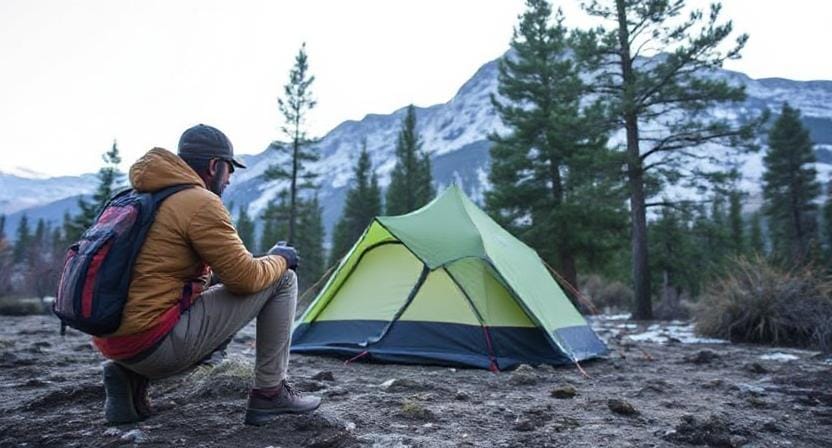
Before you even think about unrolling that fancy tent of yours, let’s discuss location—because if you pick the wrong spot, all bets are off.
First things first: avoid areas that look like they might have been designed by Mother Nature’s worst contractor. Think muddy patches or places directly under questionable trees (you don’t want to wake up with pine needles in your hair).
Look for flat ground that’s free of rocks and sticks; those little buggers can turn into back pain overnight. Ideally, find a spot near water but not too close—you don’t want to wake up feeling like you’ve gone for an unexpected midnight swim!
By the way, keep an eye out for things that could be trouble. You know, like branches that look like they could fall at any moment or those sneaky squirrels hoping to snag your snacks. They can be pretty bold!
Once you find your spot, take a second to just soak it all in. Seriously. Look around and enjoy. Maybe even do a little victory dance? I mean, who wouldn’t want to feel like a champion in the great outdoors? Just don’t go too wild. You might get some curious hikers wondering if you’ve lost your mind.
But hey, no judgment here. If it makes you happy, go for it! This is your time to relax and be in nature. Embrace it! All those little moments make camping special, and soon you’ll be feeling like a pro out there. Enjoy every second!
Unpacking and Organizing
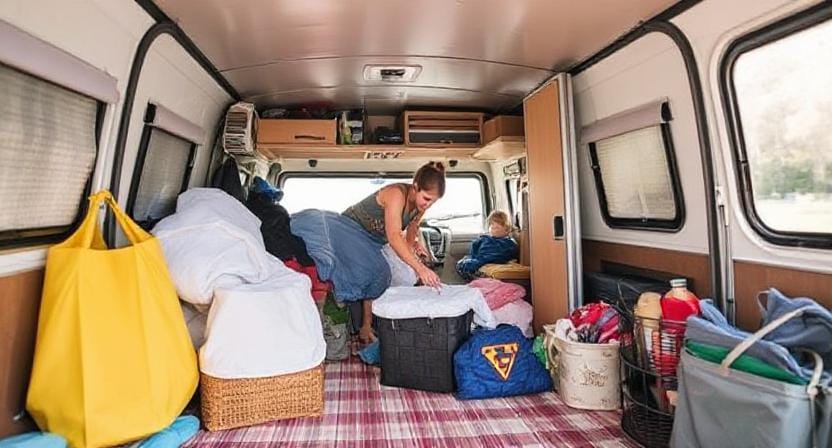
Now comes the fun part: unpacking! I’ve learned through trial and error (mostly error) that chaos leads to confusion faster than you can say “where did I put my stakes?” Lay everything out so you can see what you’re working with. Trust me; there’s nothing worse than fumbling around in darkness trying to locate that one elusive pole.
Start by spreading out your tent body on the ground where it will live its short life until morning when you’ll inevitably pack it away again (and repeat this cycle forever).
Next, spread out all your poles next to their matching sleeves or clips. This way, when you need them, they’re right there, easy to grab. It’s kind of like getting ready for a strange game show—no cash prizes, just cozy, dry socks at the end!
If you’ve got a friend with you, or maybe someone who owes you a favor, now’s the time for teamwork! It makes everything smoother. One person can work on the poles, while the other focuses on the stakes. You’ll be surprised how much faster it goes.
Just think about it: setting up can be fun with a buddy. You can laugh about mistakes and maybe even share a snack. Nothing like a little joy while you’re working hard. Plus, it makes the whole adventure feel more like a team mission. You’re in this together, and that makes it even better!
Assembling Your Tent
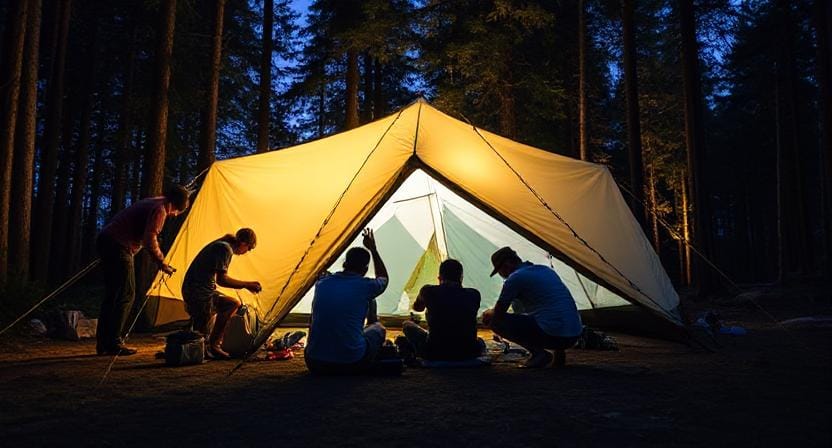
Alright, let’s get down to business: assembling that puppy! If you’re using a traditional pole-style tent (as opposed to those pop-up wonders), begin by sliding each pole through its designated sleeve or attaching them according to instructions—yes, those tiny pieces of paper we usually ignore because we’re “experts.”
As I wrestle with poles every time I camp, I can’t help but wonder if engineers secretly enjoy watching us struggle. If only they could see how many times I’ve accidentally poked myself in the eye while trying to connect two stubborn poles together!
Once you’ve got everything put together just right—maybe with a few funny words—it’s time to raise the tent. Carefully slide each pole into the little holes, or grommets, at the corners. This part takes a bit of teamwork. If you’re not careful, your tent might end up looking more like a piece of art by Picasso than a cozy shelter!
Imagine the scene: one pole goes up, then another, and suddenly you’re trying to hold everything at once. It can be a bit wobbly. Good coordination helps. Otherwise, you might be left with a tent that’s leaning, or even worse, falling over.
Just take a breath. Laugh if it gets messy! It’s all part of the camping fun. And once it’s up, the sense of achievement feels amazing. You’ll look at your tent with pride and maybe do a little victory dance. Well, maybe only in your head so passersby don’t think you’ve lost it!
Securing Your Tent
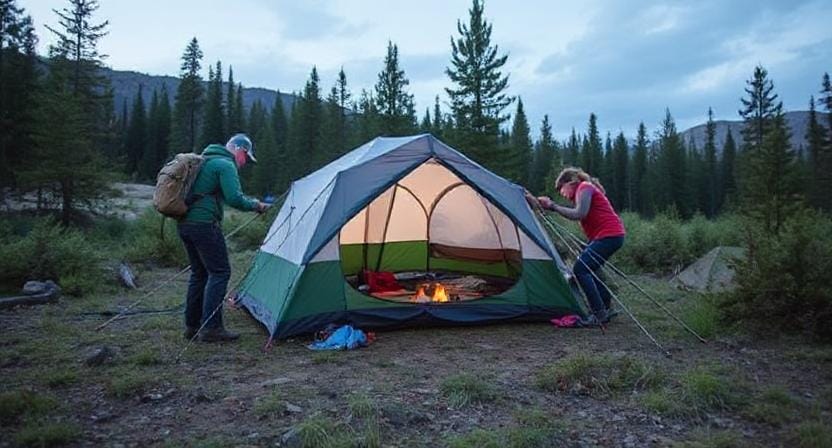
With your tent finally standing tall against nature’s whims—or swaying gently in the breeze depending on how well you’ve done—it’s time for securing it properly so it doesn’t take flight during storms or surprise gusts of wind.
Stake down each corner firmly into solid ground; trust me when I say there are few things more embarrassing than waking up inside your now-flying-away tent at 3 AM.
To keep your tent steady all night, and maybe even during a zombie apocalypse, use those guy lines if you’ve got them. They’re like stylish ropes going from the top of your tent to the stakes in the ground. Think of it as giving your tent some cool accessories! Extra support really helps, especially if the wind decides to show off.
Don’t forget about where you put your stuff inside, either. Arranging your gear makes a big difference. If you have heavy things, like a cooler stuffed with snacks or a bunch of extra socks—you know, just in case—put those near the middle or lower part of the tent. This keeps the tent from tipping over and ensures it won’t look like a circus tent after a storm.
And let’s be honest, sometimes those extra socks can be lifesavers. You never know when your feet might get chilly. Remember, the comfort of your cozy tent is worth all the little efforts! Enjoy those late-night snacks and cozy vibes.
Maintenance Tips for Happy Camping
Congratulations! You’ve successfully set up camp without losing any limbs along the way—now let’s keep it looking sharp throughout your stay! First off: avoid dragging dirt inside whenever possible unless you’re aiming for that rustic “survival chic” look.
Bringing small rugs or mats for your tent can be a game changer. They keep the mud where it belongs—outside. After a long day wandering through nature, it feels great to step onto something soft instead of cold, hard ground. You’ll appreciate that cushy feel.
Plus, let’s be real. Those little rugs give off big-time glamping vibes. Everyone loves a cozy spot to sit and relax. It makes your tent feel more like a home, even in the great outdoors.
Here’s the best part. Make friends with other campers nearby! You know, those friendly folks you see setting up their own tents. They probably have some fun stories to share while roasting s’mores around their fire. You might even pick up helpful tips from them.
And if things go a little wonky while setting up—like when you forget how many poles your tent really has—they might be there to lend a hand. It always helps to have friendly faces around when things get messy. Camping is all about those connections and shared laughter under the stars, right? Enjoy every moment!
Conclusion
Putting up a tent can be a bit like putting together a puzzle, don’t you think? But it doesn’t have to be all tension and crying. It’s fine if you lose a pole or two. Take a big breath and attempt to laugh it off. Things might get a little crazy sometimes, and that’s part of the fun.
It’s like a tiny treasure hunt to find the perfect position. It’s an adventure only to look for flat ground and avoid pebbles and sticks. It’s even better if you’re with friends or family. You can use any problem as a chance to get closer to someone.
It will feel so good when you finally figure out how to put the tent together. You feel like you did something important. Keep in mind that it’s not only about camping. You will remember those funny times and stories you told each other later.
So, yes, accepting the humor and being patient will make all the difference. The tiny bumps in the road? Just part of the crazy journey. You might have some amazing stories to tell. Later on, we might even have some fun by the campfire. Take pleasure in every minute!
Setting up a tent doesn’t have to be stressful if you follow a few smart steps. Choosing a flat campsite, organizing your gear, assembling poles correctly, and staking everything securely will keep your tent sturdy and comfortable. With a little patience and teamwork, anyone can master tent setup and enjoy the outdoors.
Frequently Asked Questions
What is the best type of location for pitching a tent?
The best location is flat, dry ground away from rocks, roots, and low areas where water may collect during rain.
Why should I organize tent parts before assembly?
Laying out all your tent components prevents lost parts and makes setup faster and more efficient.
How do I assemble tent poles correctly?
Connect poles section by section and insert them into the tent sleeves or clips as instructed to avoid bending or breaking them.
Do I really need to stake down my tent?
Yes, staking keeps your tent stable in wind and prevents it from collapsing or blowing away overnight.
What can I do if I struggle to set up a tent alone?
Ask a friend for help or practice at home before camping to build confidence and speed in the process.
How do I keep the inside of my tent clean?
Use a small mat at the entrance, remove shoes before entering, and organize gear to avoid clutter and dirt.
What are guy lines and why do they matter?
Guy lines are support cords that add tension and stability to your tent, especially in windy weather.
Suggested Resources:
Camping Tips and Tricks
https://www.rei.com/learn/expert-advice/camping-tips.html
Tent Setup Guide
https://www.outdoorgearlab.com/topics/camping-and-hiking/best-backpacking-tent
How To Choose a Campsite
https://www.campendium.com/blog/how-to-choose-a-campsite/

Kevin Collier is a seasoned outdoor enthusiast and writer for Trekbug.com, specializing in outdoor adventures, survival strategies, and prepping insights. With a deep love for nature and a commitment to self-sufficiency, Kevin empowers readers to embrace the wilderness confidently. He shares valuable tips, practical techniques, and inspiring stories, helping both novice and experienced adventurers develop essential skills for surviving and thriving in the great outdoors.





